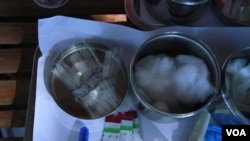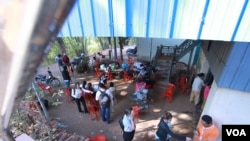Loeum Lorm is among almost 300 people who were found to be HIV-positive in Roka village in Battambang province’s Roka commune two years ago.
The 52 year old became a volunteer to assist people living with HIV to receive medical treatment after the outbreak. He is one of many seeking compensation from Yem Chrin, a medic in Roka who was blamed for the mass infection by using tainted needles.
In a recent interview Lorm said numerous villagers in Roka had yet to receive compensation.
“I haven’t received it yet. I just want to get it for myself, excluding my family. I can get at least hundreds of thousands of dollars. But I reduced it, meaning I want to say that I want to get $4,000 for myself,” he said.
Chrin was sentenced by the Battambang Provincial Court to 25 years in prison and fined 5 million riel (about $1,250) for running the clinic without permission from the Ministry of Health, knowingly infecting people with HIV and torture, according to court documents.
In total, more than $20,000 in compensation was promised to the victims, according to Leng Monyneath, a former medical staffer at human rights group Licadho, who observed the court proceedings.
But Heng Luy, the court’s deputy prosecutor, said until claimants claim to release the compensation they would not receive a penny.
“They didn’t submit a lawsuit asking the court to implement [the verdict]… now it seems that they didn’t file lawsuit to complaint about the verdict,” he said.
Em Sovann, Chrin’s lawyer, could not be reached for comment, while Judge Yich Chhear Navy declined to comment on the compensation payments.
Lorm said he will seek legal counsel in order to demand compensation from the court, noting that his family had to sell farmland in order to pay his medical bills.
“I spent a lot of money on treatment. I spent money on the treatment until I lost rice fields, cows and buffalo, so I lost a lot,” he said, adding that he estimated he spent at least $2,800 on treatment just from the sale of his cattle.
Other Roka villagers diagnosed with HIV in the outbreak had similar stories of loss.
Say Sao, another victim, said the local authorities and court officials had not approached the villagers to provide information about compensation procedures.
“What’s going on after the complaint was filed to the court? Is it voided? I am still unsure of this point. [We] filed the complaint a long time ago but we didn’t hear anything,” she said.
Of the 292 people so far identified as having contracted HIV in the outbreak, some 276 are known to be receiving antiretroviral drugs while the other 16 have since died.
Sim Pov, the Roka commune chief, said those who died were either elderly or infants, and while treatment continues to be provided no compensation has yet been forthcoming.
Meanwhile Chrin, 57, has been jailed in Battambang prison and handed a lifetime ban from practicing medicine.
Chrin’s daughter, Chrin Raksa, 27, declined to comment on whether the family could afford to make the compensation payments if there were new claims filed to the court, claiming the family was struggling to pay for Chrin’s meals at the prison, which they said were not provided by the state.
Lorm, who volunteers with the NGO Buddhism Center for Development, said local health centers had been ill-equipped and slow to provide medical treatment, making people turn to off-the-books services such as those provided by Chrin.
“The health center in Roka was slow because doctors always asked for poverty cards. If the patients do not have the card, they have to pay for the service and medicine,” he said, referring to government-issued cards that are handed out to the poorest in society and can secure free treatment at state-run facilities.
Sao agreed with Lorm’s assessment, saying there were never doctors on hand at the Roka heal center to treat patients.
“When we arrive, there are no doctors. When we leave there, the doctor would arrive,” she said.
Soeun Sophat, a staff member at the Roka commune health center, acknowledged there were shortcomings and that the government clinic did not provide some services offered by private clinicians.
”Normally, the health center does not allow us to provide medicine injections unless it’s vaccines that they are assigned to. It’s different from private clinics, where the doctors are always available and provide vaccinations for any patients who want them,” she said.
The health center also did not provide services to people with serious health conditions, she added, instead referring them to better equipped hospitals in nearby towns and in Battambang.
Despite the lack of compensation, the Roka villagers have high hopes for the future as discrimination towards those who were infected has now subsided.
However, Lorm appealed to donors to continue to support the victims. Health center workers had been doing their best to provide better services in the aftermath of the outbreak, he said, while business at the private, largely unregulated clinics had been banned.












